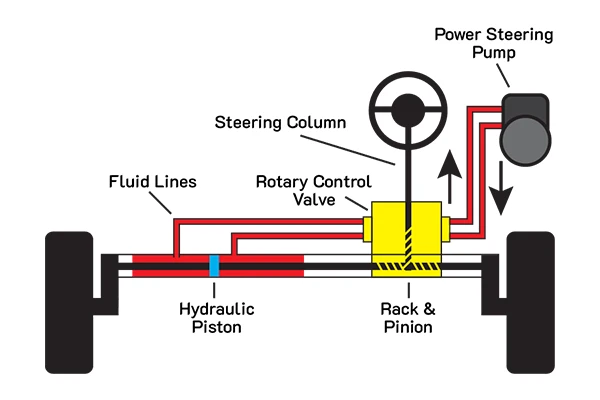Symptoms of a Bad Power Steering Pump
Since its inclusion became standard in new vehicles, power steering has been taken for granted by most drivers. It’s easy to overlook it when working properly, but when your steering feels off, you’ll be hard-pressed to ignore the issue for long.
What is Power Steering
Prior to the addition of power steering to most vehicles, turning the vehicle meant turning the entire weight of the vehicle.
Traditional power steering solves this problem through the use of hydraulics, which use an incompressible fluid to amplify and transfer forces from one place to another. This allows for the movement of the steering wheel to feel light and manageable while still turning the vehicle.
How Does Hydraulic Power Steering Work?
The power steering system starts with the pump, which continuously circulates pressurized power steering fluid throughout the system. Using a component called a rotary valve, fluid is directed either back to the pump or into either side of the fluid reservoir.
While the steering wheel is in a neutral position, all of the fluid is looped back to the pump. However, when turning, the hydraulic piston will be shifted to the side and the fluid will be directed to the opposite side’s fluid reservoir. This pressure difference will allow you to turn the vehicle with little force on the steering wheel.

Symptoms of Bad Power Steering Pump
Whining or Groaning Sounds
One of the telltale signs of a bad power steering pump is the distinct whining noise it may make when turning the wheel. This sound is primarily caused by an effect called “cavitation”, which is when air bubbles present in the hydraulic fluid hit the impeller causing a worrisome groan. The presence of air bubbles or lack of fluid can be caused by a leak in the pump itself.
This noise doesn’t always mean your pump has an issue, as cavitation can occur from reasons such as old fluid or the introduction of air bubbles elsewhere in the system.
“Stiff” Steering Feel
Another possible symptom of a bad power steering pump is the lack of hydraulic assistance when turning. As hydraulic fluid isn’t being pumped through the system (or at least at the same rate), your steering wheel may feel extra difficult to rotate.
Visible Leaks
One of the most obvious signs your pump is on its way out is if it’s leaking. Of course, these fluid leaks can happen from various places throughout the steering system, but when present in the power steering pump it’s time to have yours replaced.
A leaking pump will continually cause your vehicle to run with low fluid, which can not only damage the pump further but also the other sensitive steering components around it.
Silver Flecks in Fluid
Although a rare problem, bits of your power steering pump can begin to dissolve into the fluid and leave noticeable flecks of metal throughout. As you might guess, there isn’t much that can be done to repair this, and the pump will likely require replacement.
How Do I Protect My Power Steering Pump?
If you’re wondering how to avoid these issues and help your power steering pump run as long as possible, there are some simple steps you can take:
Ensure Proper Fluid Quality
The easiest step is making sure that the fluid running through your pump is in the proper condition. As fluid cavitates and fills with air bubbles it will cause rapid wear to the components within the pump.
Keep an Eye Out For Leaks
Running the correct level of fluid is crucial to the health of your power steering pump, so any leaks in the system could cause damage to your pump if the fluid reaches a low enough level. If you notice a red fluid leaking from under your vehicle, you should have your vehicle inspected promptly by a trusted automotive professional.
Use the Proper Fluid
While all power steering fluid has the same purpose, that doesn’t mean they’re all interchangeable. Many of these fluids have different chemical makeups, which their power steering systems are designed to run and handle. However, when using the wrong fluid, it can create chemical reactions with leftover fluid and sensitive gaskets.
Some vehicles recommend using a certain type of automatic transmission fluid in the power steering system due to their similar makeup and properties. However, you should be extra sure your vehicle is meant to run ATF rather than purpose-made power steering fluid.
Your owner’s manual will be the most accurate place to find what kind of power steering fluid is necessary in your vehicle.
Steering System Services at Borst Automotive
If you’re located in the Tucson, Phoenix, or Mesa area and need your vehicle’s steering system inspected or repaired, trust the experienced technicians at Borst Automotive. No matter the location you visit, our friendly team and friendly advisors will ensure your vehicle is receiving the proper care! Give us a call or schedule online at any of our four locations today.

Borst Automotive is here to help when you need it. Give us a call, schedule an appointment, or stop in today!
